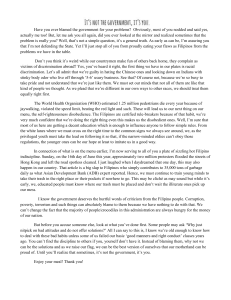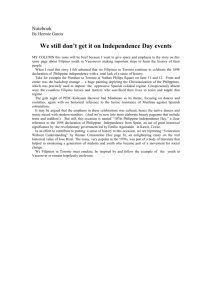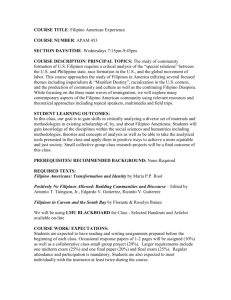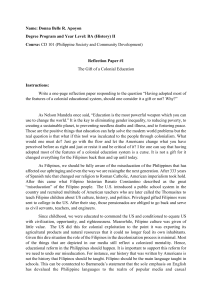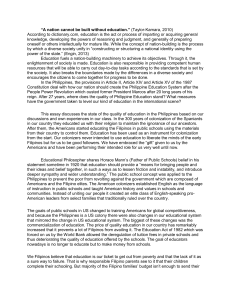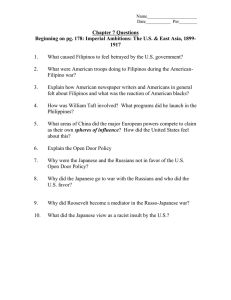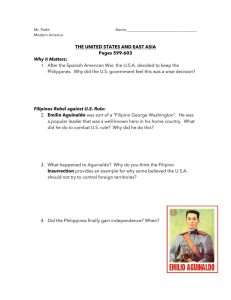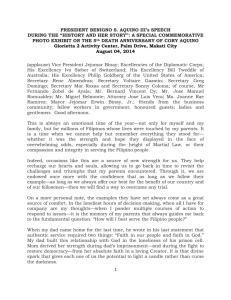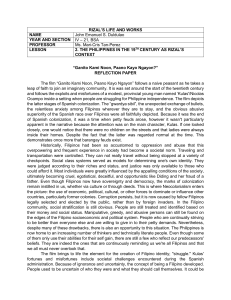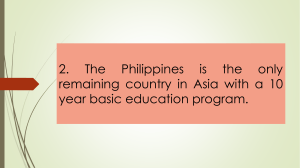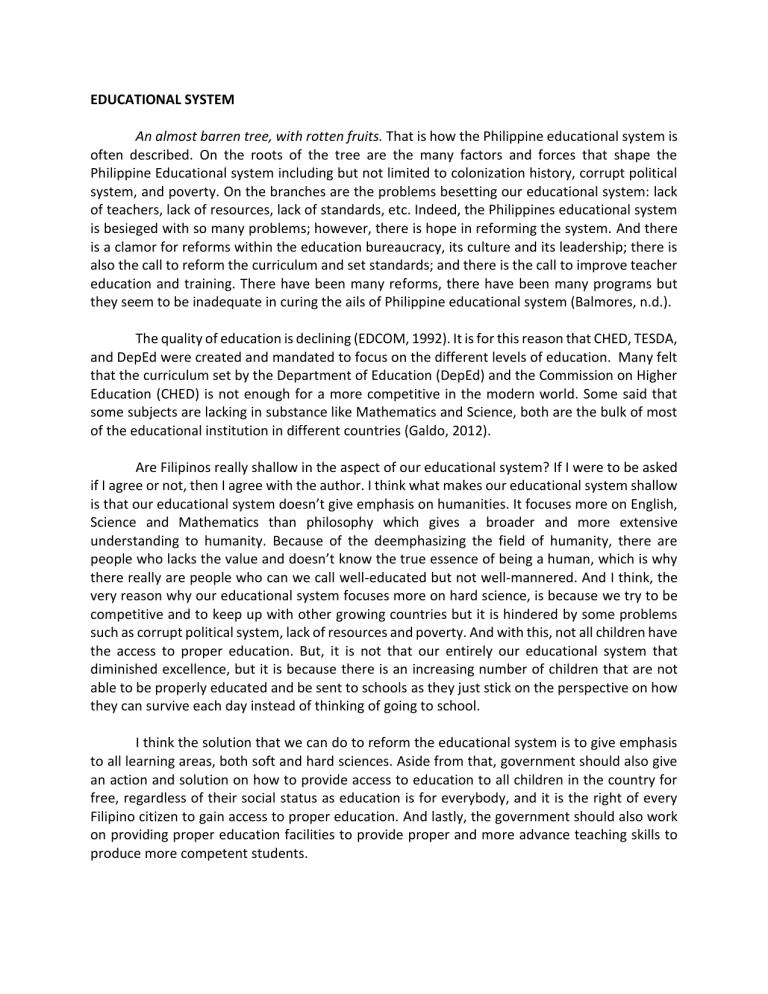
EDUCATIONAL SYSTEM An almost barren tree, with rotten fruits. That is how the Philippine educational system is often described. On the roots of the tree are the many factors and forces that shape the Philippine Educational system including but not limited to colonization history, corrupt political system, and poverty. On the branches are the problems besetting our educational system: lack of teachers, lack of resources, lack of standards, etc. Indeed, the Philippines educational system is besieged with so many problems; however, there is hope in reforming the system. And there is a clamor for reforms within the education bureaucracy, its culture and its leadership; there is also the call to reform the curriculum and set standards; and there is the call to improve teacher education and training. There have been many reforms, there have been many programs but they seem to be inadequate in curing the ails of Philippine educational system (Balmores, n.d.). The quality of education is declining (EDCOM, 1992). It is for this reason that CHED, TESDA, and DepEd were created and mandated to focus on the different levels of education. Many felt that the curriculum set by the Department of Education (DepEd) and the Commission on Higher Education (CHED) is not enough for a more competitive in the modern world. Some said that some subjects are lacking in substance like Mathematics and Science, both are the bulk of most of the educational institution in different countries (Galdo, 2012). Are Filipinos really shallow in the aspect of our educational system? If I were to be asked if I agree or not, then I agree with the author. I think what makes our educational system shallow is that our educational system doesn’t give emphasis on humanities. It focuses more on English, Science and Mathematics than philosophy which gives a broader and more extensive understanding to humanity. Because of the deemphasizing the field of humanity, there are people who lacks the value and doesn’t know the true essence of being a human, which is why there really are people who can we call well-educated but not well-mannered. And I think, the very reason why our educational system focuses more on hard science, is because we try to be competitive and to keep up with other growing countries but it is hindered by some problems such as corrupt political system, lack of resources and poverty. And with this, not all children have the access to proper education. But, it is not that our entirely our educational system that diminished excellence, but it is because there is an increasing number of children that are not able to be properly educated and be sent to schools as they just stick on the perspective on how they can survive each day instead of thinking of going to school. I think the solution that we can do to reform the educational system is to give emphasis to all learning areas, both soft and hard sciences. Aside from that, government should also give an action and solution on how to provide access to education to all children in the country for free, regardless of their social status as education is for everybody, and it is the right of every Filipino citizen to gain access to proper education. And lastly, the government should also work on providing proper education facilities to provide proper and more advance teaching skills to produce more competent students. If we can get most Filipino children their basic necessities like enough food, proper healthcare, and proper education, there will be a bigger market for a more diverse culture. If we can give most Filipino adults opportunities not only to survive for every day, but to thrive in our country, then we will have a vigorous education, economy, industry, and culture, where we can all strive for something other than survival. EGO As G.K. Chesterson once said “Humility is the mother of all giants. One sees great things from the valley; only small things from the peak.” Behind every successful person is a great humility. Are we, Filipinos boastful, or we are just too humble to accept the fact that we are great? For me, I agree with Roncesvalles, with what she said that, we Filipinos are humble enough to the fact that we even accept to be servants of other foreigners in other countries. Thus, we do not think highly of ourselves because if we did, we should probably not be dependent of other countries. Therefore, I don’t agree with the author. Because the fact that we collaborate with other countries, we ask for their help is an evidence that we are prideful and we don’t think that we can manage our country alone. There are just other people who think that they should always be in a high position and those who can’t willingly accept constructive criticisms because they think highly of themselves. But with I observed, most filipinos are humble. Like for instance, you are commending someone for his/her successful business, most of the responses are likely, “Ay, hindi naman, maliit na negosyo lang ito.” This just shows that we have the humility and we are not shallow with our ego. I think the solution or action that we can give to those Filipinos who are boastful and egodriven is that, they should provide space for humility in their lives. It is one of the essentials in living. They should always think that they are human too, they commit mistakes and whatever they do, they will encounter someone once in their lives who are better than them, it’s just a matter of acceptance within themselves. They should also think that our capabilities are just limited. They should not be afraid of constructive criticisms as these helps them to grow more as a person. And as the popular saying goes by, “No man is an island”, therefore they should not be afraid to seek help if they already felt the need to, because as humans, we are created to unite and help each other.
